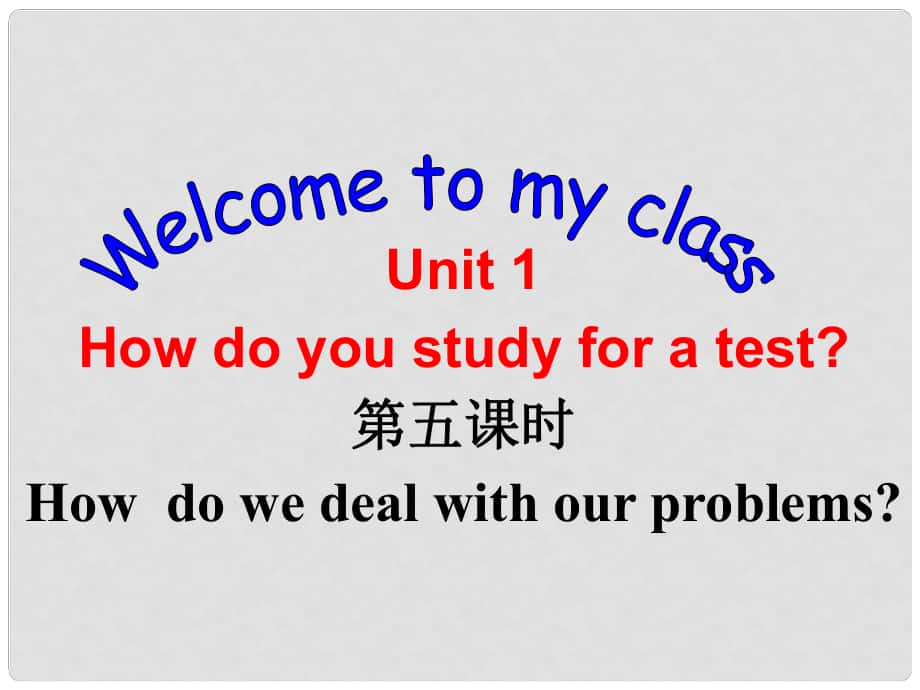《湖北省孝感市九年級(jí)英語(yǔ)下冊(cè) Unit 1 How do you study for a test課件 人教新目標(biāo)版》由會(huì)員分享,可在線閱讀,更多相關(guān)《湖北省孝感市九年級(jí)英語(yǔ)下冊(cè) Unit 1 How do you study for a test課件 人教新目標(biāo)版(12頁(yè)珍藏版)》請(qǐng)?jiān)谘b配圖網(wǎng)上搜索��。
1��、Unit 1 How do you study for a test?第五課時(shí)第五課時(shí)How do we deal with our problems? Why is the boy unhappy in Picture 1 ?Why is the girl happy in Picture 2 ?New wordsHow do we deal with our problems? 我們?cè)鯓咏鉀Q我們的問(wèn)題呢?我們?cè)鯓咏鉀Q我們的問(wèn)題呢��? unless we deal with our problems, we can easily become unhappy. 如果我們不解決問(wèn)題��,就很容易不如
2��、果我們不解決問(wèn)題��,就很容易不快樂(lè)��。快樂(lè)。dealunlessyou felt they were unfair. 你感覺(jué)他們不公平��。你感覺(jué)他們不公平。When we are angry, however, we are usually the ones affected. 我們生氣時(shí)��,自己卻通常是受害者。我們生氣時(shí)��,自己卻通常是受害者��。unfairaffectedwe can solve a problem by learning to forget. 我們可以通過(guò)學(xué)會(huì)忘記來(lái)解決問(wèn)題��。我們可以通過(guò)學(xué)會(huì)忘記來(lái)解決問(wèn)題。We must learn how to change these “prob
3��、lems” into “challenges”. 我們必須學(xué)會(huì)如何將這些我們必須學(xué)會(huì)如何將這些“問(wèn)題問(wèn)題”轉(zhuǎn)換轉(zhuǎn)換成成“挑戰(zhàn)挑戰(zhàn)”��。solvechallengeStephen Hawking, , who regards his many physical problems as unimportant. 史蒂芬史蒂芬霍金認(rèn)為霍金認(rèn)為, ,他身體方面的許多他身體方面的許多問(wèn)題不重要��。問(wèn)題不重要。We are probably quite healthy and smart. 我們或許是非常地健康和聰明��。我們或許是非常地健康和聰明��。regardsmart Lets not worry about
4、 our problems. Lets face the challenges instead. 我們不要為問(wèn)題焦慮��,而是要面對(duì)挑戰(zhàn)。我們不要為問(wèn)題焦慮��,而是要面對(duì)挑戰(zhàn)��。As young adults, it is our duty to try our best to deal with each challenge in our education with the help of our teachers. 作為青年人,在老師的幫助下盡力去應(yīng)對(duì)作為青年人��,在老師的幫助下盡力去應(yīng)對(duì)學(xué)習(xí)上的每一個(gè)挑戰(zhàn)是我們的義務(wù)��。學(xué)習(xí)上的每一個(gè)挑戰(zhàn)是我們的義務(wù)。insteaddutyFast reading
5��、 by talking to people about them trying to forget about them by thinking your problem is not big by seeing a psychologist by breaking off a friendship by thinking of a problem in a positive wayScan the reading and check ()the ways of dealing with problems that are mentioned .()()()Choose the best an
6��、swers according to the reading.( ) 1.How many ways of dealing with problems are mentioned in the passage? A. 2. B. 3. C. 4 . D. 5.( ) 2.How will you find your problems are not so terrible? A. By learning to forget. B. By regarding problems as challenges. C. By thinking of something worse. D. By hidi
7、ng yourself from them.( ) 3.We can learn from the passage that Stephen Hawking _. A. is a disabled person B. is infamous C. regards his physical problems as important D. worries about his problems a lot( ) 4.From the reading we can infer that young children usually decide not to talk to each other a
8、fter they have disagreements for _.A. one or two daysB. one or two monthsC. one or two yearsD. three or four years( ) 5.According to the article, which of the following ideas is NOT true?A. When we cant solve our problems, we should worry about them a lot.B. We can turn our problems into challenges.
9��、C. If you cant forget the disagreements with your friend, your friendship may be lost.D. If we have problems, one way we can come up with is to ask teachers for help.Fill in the blanks with proper words or phrases in the text.(1)_he studies hard, he will never pass the examination.(2)The teacher was
10、 very _with me when I was late again.(3)Things will get easier as time_.(4) The old man_ the poor boy as his own son. (5) By _yourself to other people, you will find your problems are not so terrible.Unlessangrygoes byregardscomparing1. Write a passage about how you solve one of your problems.2. Do some relevant exercises chosen by the teacher.Homework
 湖北省孝感市九年級(jí)英語(yǔ)下冊(cè) Unit 1 How do you study for a test課件 人教新目標(biāo)版
湖北省孝感市九年級(jí)英語(yǔ)下冊(cè) Unit 1 How do you study for a test課件 人教新目標(biāo)版

